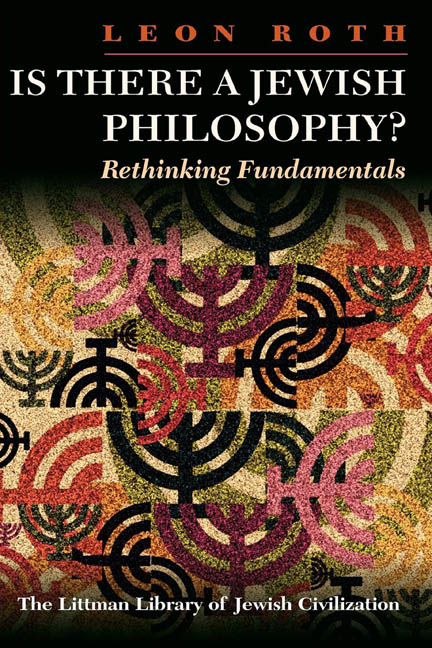Book contents
- Frontmatter
- Dedication
- Contents
- Publisher's Note
- Foreword
- Note
- Is there a Jewish Philosophy?
- Imitatio Dei and the Idea of Holiness
- Jewish Thought as a Factor in Civilization
- The Significance of Biblical Prophecy for Our Time
- Some Reflections on the Interpretation of Scripture
- Baruch Spinoza: His Religious Importance for the Jew of Today
- Judaism: The Elements
- Authority, Religion, and Law
- Moralization and Demoralization in Jewish Ethics
- Mysticism, Thick and Thin
- Back To, Forward From, Ahad Ha'am?
- Maimonides
- Bibliography of the Writings of Leon Roth
- Index
Baruch Spinoza: His Religious Importance for the Jew of Today
- Frontmatter
- Dedication
- Contents
- Publisher's Note
- Foreword
- Note
- Is there a Jewish Philosophy?
- Imitatio Dei and the Idea of Holiness
- Jewish Thought as a Factor in Civilization
- The Significance of Biblical Prophecy for Our Time
- Some Reflections on the Interpretation of Scripture
- Baruch Spinoza: His Religious Importance for the Jew of Today
- Judaism: The Elements
- Authority, Religion, and Law
- Moralization and Demoralization in Jewish Ethics
- Mysticism, Thick and Thin
- Back To, Forward From, Ahad Ha'am?
- Maimonides
- Bibliography of the Writings of Leon Roth
- Index
Summary
BEFORE I come to my theme it may be well to remind ourselves of a few facts of literary history.
Spinoza was born in Amsterdam some ten months after this great and famous university was inaugurated, on 24- November 1632, and died at the Hague on 21 February 1677. His fame rests principally on two books, the Tractatus Theologico-politicuspublished anonymously in 1670 and the Ethica published in 1677 by his friends as a part of his Opera posthuma. Of these two books it was the former, the Tractatus Theologico-politicus, which in its time created the stir. The Ethica waited for notice a full hundredyears.
Yet, once noticed, the Ethica came into its own; the Tractatus passed into history. The Tractatus belongs to time, the Ethica to eternity; and it is this distinction, the distinction between the things of time and the things of eternity, so strikingly exemplified in the history of Spinoza's own work, which is the main lesson that men of religion today can derive from the study of Spinoza.
We are assembled this evening in order to learn for our present need from a thinker of the seventeenth century born and bred in this city of Amsterdam; and the first question we should ask ourselves is why it should be just this city, this people, this country and its institutions, which made his life, and thinking, possible. And not his life alone. Seventeenth-century Holland first set the example followed so nobly by Holland of the twentieth century of offering refuge and peace to the wanderer and homeless. I read to you a few sentences from a letter of one of them written in May 1631:
I walk every day among the thronging crowds as freely and quietly as you could in your private park … What other country could one find in the whole world where one can enjoy such complete liberty, and sleep with such a sense of security; where there are armed forces always on the watch to guard us; where poisonings and treacheries and calumnies are less known?
It is René Descartes who is writing, in this very city of Amsterdam, a year before Spinoza was born; and he praises the industry and prosperity of its inhabitants, its public order and private amenities, its allowing everyone to pursue his own affairs without interference. Spinoza, writing nearly forty years later, sees deeper.
- Type
- Chapter
- Information
- Is There a Jewish Philosophy?Rethinking Fundamentals, pp. 95 - 107Publisher: Liverpool University PressPrint publication year: 1999



